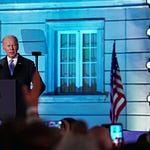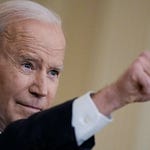Please consider subscribing for $6 a month to support fearless media commentary. Thanks!
Stay healthy.
Be kind.
Maintaining the New York Times’ strident, defensive stance of refusing to acknowledge any fault in the paper’s spectacularly failed 2016 campaign coverage, executive editor Dean Baquet last week insisted the paper made no mistakes covering Hillary Clinton’s historic run.
The denial comes as the press is faced with a stunning double standard used to cover Clinton and Trump and their handling of classified documents. In 2015 and 2016, the press, led by the Times, treated that topic and Clinton’s private emails as the defining issue of the day. Today, news that Trump smuggled boxes of top-secret documents out of the White House is treated as a minor event, by comparison.
“I don’t have regrets about the Hillary Clinton e-mail stories,” Baquet recently told The New Yorker. “It was a running news story. It was a serious F.B.I. investigation. The stories were accurate.”
The Times published hundreds of But Her Email articles and columns. Is Baquet vouching for all of them? Here’s one that was corrected twice and still contained a false claim.
Baquet suggests the paper dedicated so much time and attention to the emails because there was a “serious FBI investigation.” But the Times didn’t know the FBI was investigating until August 2015, five months after the paper began its relentless and hyperactive coverage.
The editor’s next sentence in The New Yorker interview after he mentioned the FBI? “My God, we were writing stories about Donald Trump harassing women—we did the first of those.”
That’s the weak defense Baquet has clung to for years — the Times’ coverage of Clinton wasn’t dishonest because the paper treated Trump the same way. In 2016, Trump was a known pathological liar and sexual predator who openly appealed to racists. Clinton was the former secretary of state, First Lady, and U.S senator. Why would any newsroom cover them the same?
Banquet also told The New Yorker he never thought Trump would win in 2016, which confirms the idea that the paper’s gotcha email coverage was designed to make sure Clinton’s probable historic victory didn't taste sweet, and that she limped across the finish line. (The paper has a long and embarrassing history of harassing the Clintons.)
The Times embraced a misogynistic, But Her Emails narrative that depicted the first female presidential nominee as being deeply untrustworthy in a way that powerful men in politics were never depicted when they used private emails. (See here and here.)
Baquet has a history of making sweeping, baseless claims in an effort to coverup the egregious 2016 sins that unfolded on his watch. When the Times switched over to the other Clinton email story in the summer of 2016, they helped boost Russian hackers who peddled leaked emails. Two years later, Baquet claimed the paper had no idea Russians were involved. “We didn’t know then what we know now," he claimed in 2018. "Obviously the origins of the emails are a far bigger story than what was contained in them. But we didn’t know that at the time."
They didn’t know? In June 2016, a cybersecurity firm hired by the Democratic National Committee posted a public notice that concluded the hack had been carried out by two groups associated with Russian intelligence. That July, top U.S. officials confirmed that Russians were behind the illegal attack on the DNC.
Refusing to deal with legitimate criticism has been a hallmark of Baquet’s tenure. He oversaw the elimination of the paper's public-editor position. At the time, the newspaper claimed that social media would serve as the paper's collective public editor, because readers would hold the paper accountable.
Not only hasn’t Baquet embraced Twitter as a public forum to hold the newspaper accountable, he’s told his newsroom to ignore the online critiques. (Especially if they come from the left.) Staffers, “shouldn’t be afraid of taking on subjects that are edgy and complicated…They should report those subjects independently and fairly, and if Twitter doesn’t like it Twitter can jump in the lake,” he boasted to The New Yorker.
Apparently at the Times, typing up a conveyor belt of fawning stories about Trump voters in Midwestern diners qualifies as “edgy and complicated.”
A note about the New Yorker interview. There was zero pushback or follow-up to Banquet’s proud boast that he has no regrets about the emails fiasco, or that the paper was right to treat Trump and Clinton equally. Baquet refuses to expose himself to serious criticism. When he gives interviews he knows that he won’t have to mount a serious defense of the paper. That he’ll likely be asked perfunctory questions about criticism the daily faces and then move on.
It’s always startling to watch journalists who demand transparency from public officials refuse to provide it themselves.
(Photo: Mike Coppola/Getty Images)
🇺🇦 GOOD STUFF:
From Jon Allsop’s piece in the Columbia Journalism Review, “A week of Whiplash And The Need For Cool Heads Over Russia and Ukraine”:
[Volodymyr Zelensky] and others do have a point, however, when they call the current US media coverage alarmist—very simply, much of it is sounding the alarm, loudly and incessantly so. Again, this tone is often entering coverage downstream of American politicians’ own alarming statements, and alarm might be warranted. But our job is to do more than write down what officials are saying, and alarm, when not immediate and independently corroborated, can be an unhelpful—even harmful—mode in media coverage. The facts here are murky, but journalists should know full well by now that the media is in the crossfire of an information war, and that fact, at the very least, should be a prominent and omnipresent caveat in our coverage of intelligence assessments and predictions.
🎹 FUN STUFF — BECAUSE WE ALL NEED A BREAK
Eddie Vedder & Elton John, “Picture”
Can these two just make an entire album already? Last year, they recorded two new songs. The first, “E-Ticket,” appeared on John’s latest record. It was an undeniably fun, classic rock, piano romp.
Now comes “Picture,” off Vedder’s new release, and it’s just as raucous and infectious. The duo clearly had a blast recording these songs, and hopefully they’ll circle back for more.
A picture tells a thousand words, some of them were mine
Combing through the evidence, afraid of what we'll find
The sun could lift us up, should this thunder ever stop
There's no over, there's no under, there's no shame
🎙 Click here to listen to the music that’s been featured on PRESS RUN, via Apple Music.













